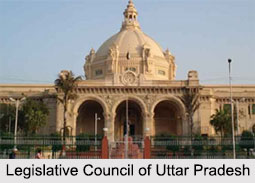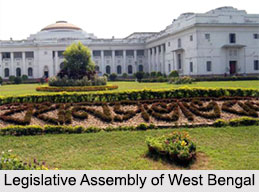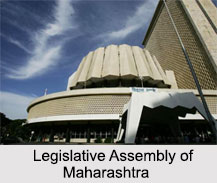 State legislature in India refers to a law making legislature in each state of the country. It comprises of two houses called the Legislative Assembly and the Legislative Council. In some states, there is unicameral legislature, with only one house called State Legislative Assembly. Others have bicameral legislature, with 2 houses namely, the State Legislative Council (Upper House or Vidhan Parishad) and the State Legislative Assembly (Lower House or Vidhan Sabha). States like Jammu and Kashmir, Uttar Pradesh, Bihar, Andhra Pradesh, Telangana, Maharashtra and Karnataka have bicameral legislature, whereas others have unicameral legislature. Each house of the state legislature in India is summoned from time to time by the Governor, who may also prorogue the house or either house and dissolve the Legislative Assembly. The period for which the house should meet or the required duration of the sessions is not mentioned in the Constitution, but the gap between the two sessions must be less than 6 months.
State legislature in India refers to a law making legislature in each state of the country. It comprises of two houses called the Legislative Assembly and the Legislative Council. In some states, there is unicameral legislature, with only one house called State Legislative Assembly. Others have bicameral legislature, with 2 houses namely, the State Legislative Council (Upper House or Vidhan Parishad) and the State Legislative Assembly (Lower House or Vidhan Sabha). States like Jammu and Kashmir, Uttar Pradesh, Bihar, Andhra Pradesh, Telangana, Maharashtra and Karnataka have bicameral legislature, whereas others have unicameral legislature. Each house of the state legislature in India is summoned from time to time by the Governor, who may also prorogue the house or either house and dissolve the Legislative Assembly. The period for which the house should meet or the required duration of the sessions is not mentioned in the Constitution, but the gap between the two sessions must be less than 6 months.
Eligibility Criteria for Membership in State Legislature in India
 In order to be eligible for membership, a person must be a citizen of India and must take an oath to the Constitution of India. In case of the Assembly, a person should not be less than 25 years of age. In case of the Council (article 173), he should not be less than 30 years of age, as on the date of nomination.
In order to be eligible for membership, a person must be a citizen of India and must take an oath to the Constitution of India. In case of the Assembly, a person should not be less than 25 years of age. In case of the Council (article 173), he should not be less than 30 years of age, as on the date of nomination.
Composition of State Legislature in India
According to the Constitution of India, the Legislative Assembly of a state shall consist of not more than 500 and not less than 60 members, chosen by direct election from territorial constituencies. The Legislative Council shall not exceed one third of the total membership of the Legislative Assembly of a state, and is subject to a minimum of 40 members. One third of the members shall be elected by municipalities, district boards and other local authorities, as specified by the Indian Parliament. One twelfth shall be elected by graduates` constituency, one twelfth by the teachers` constituency, one third by members of the Legislative Assembly and the remaining one sixth shall be nominated by the Governor. Elections to the Council are to be held by the system of proportional representation, by single transferable vote. The term of the Legislative Assembly shall be for 5 years. The Council shall continue and is not subject to dissolution, but one third of its members shall retire in every 2 years. The Assembly has a Speaker and a Deputy Speaker, elected by the house. The Council has a Chairman and a Deputy Chairman, elected by the Council.
Powers of State Legislature in India
 State Legislature in India has exclusive jurisdiction to legislate on items in the State List and has concurrent jurisdiction, in respect of items in List III. According to Articles 200 and 201, the Governor can reserve some bills for the consideration of the President. The Indian President can give his assent to the bills or withhold his assent. Corresponding to the President`s power under Article 123, the Governor also enjoys power to issue ordinances.
State Legislature in India has exclusive jurisdiction to legislate on items in the State List and has concurrent jurisdiction, in respect of items in List III. According to Articles 200 and 201, the Governor can reserve some bills for the consideration of the President. The Indian President can give his assent to the bills or withhold his assent. Corresponding to the President`s power under Article 123, the Governor also enjoys power to issue ordinances.
State Legislature in India has the power to levy taxes with respect to all the subjects of the State List. The Legislative Assembly has the power to control the Council of Ministers. The elected members of the Legislative Assembly take part in the election of the President of India. They have the power to elect representatives of the state in the Rajya Sabha. The Union Parliament can make some constitutional amendments, only with the ratification by at least half of the state legislatures. The Legislative Assembly can adopt a resolution for the creation or elimination of Legislative Council.
Similarities between State Legislature in India and Union Parliament
General rules for conducting of business in the Legislative Assembly/ Council (articles 188 and 189), provisions regarding disqualification of members, vacation of seats, penalty for unauthorized sitting in the house (articles 190 193), powers, privileges and immunities for houses of legislatures, members and committees (article 194), salaries and allowances of members (article 195), legislative procedure including that for passing money bills and other bills (articles 196-200 and 208 212) and procedure in financial matters (articles 202-207) are all very similar to corresponding provisions with respect to the Union Parliament.




















